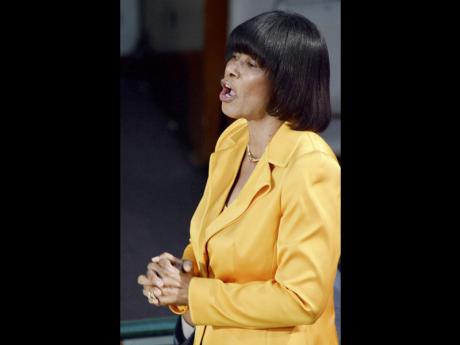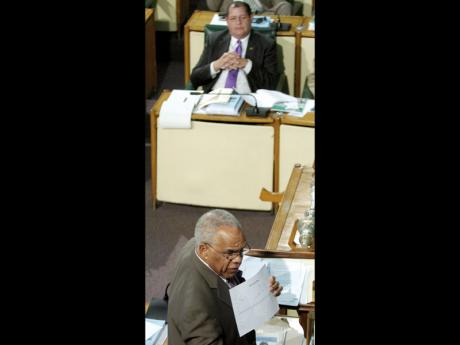PNP slips with re-election Budget
Ian Boyne, Gleaner Writer
Journalists Cliff Hughes and George Davis wondered aloud after Finance Minister Audley Shaw's Budget presentation how Omar Davies could recover from the politically devastating, feel-good Budget that had been delivered. "He will start from zero," Davis opined. He did, and did not recover from Shaw's much-applauded, private sector-endorsed Budget.
"For a long time, I have not seen a finance minister receive so much praise for a Budget presentation," Cliff Hughes, the country's sharpest and most politically astute newsman, said. It was a rough pitch that was set for Omar Davies. And even for a fine batsman like him, there was not much he could do with that pitch and so deafening a crowd support for the opponents. Especially from the grandstand where the Big Boys sip Johnnie Walker Black.
Even my good friend - and Davies' even better friend - Ralston Hyman reportedly poured cold water on Davies' presentation in his critique. It was always going to be a difficult task for Davies to tear apart a Budget which has seemed to breathe new life into the beleaguered Jamaica Labour Party (JLP), whose leader had been written off and whose electoral chances had been buried by even Labourites known to me. The TVJ-RJR polls carried all of last week seemed like yesterday's news in light of the Shaw Budget and its political ramifications.
Meanwhile, the rumblings have started in the People's National Party (PNP), and its ever-increasing ascendancy seems to be experiencing a little stalling. A major indication of this was when The Sunday Herald - shall we say, not known to be hostile to the PNP - carried a stunning editorial last week, titled 'What the PNP must do'. Its first line made me look again to see which paper I was reading: "It is not the lack of nerve by the leadership of the PNP that is suggestive of the demise of the party. Rather, it is their lack of strategic thinking while being bogged down with trivia that is the telltale sign that a once great movement is but a shadow of itself."
Unfair attack
It is not just a shocking statement coming from the Herald but, in my view, a patently and manifestly unfair and irresponsible attack on the leadership of the party, and its president, Portia Simpson Miller, specifically. "What is self-evident," the editorial goes on, "is that there is very little coming out of the party that suggests a clarity of vision, unity of purpose, and a core of policy priorities in the national interest." Only a political novice would wonder for a second what this is all about. And even he, after reading further and moving to another article on the same editorial page, 'Opposition leader should keep promises', should be shorn of his naivety.
"It is time to throw out some of the lazy and non-performing spokespersons in the opposition leader's shadow Cabinet," the article begins. This letter from a self-confessed supporter of the party calls upon the opposition leader to reshuffle as follows: "Ministry of Finance, Planning and the Public Service - Peter Phillips," with Omar Davies shunted to education, where he can multiply his innovative constituency educational thrust.
The howls against Roger Clarke's making a Budget presentation for the party, instead of a younger member - taken up, coincidentally, by The Gleaner that same Sunday in its editorial - have been heeded in this new political chess game. It seems we are getting the first whiff of election breeze. And if that is so, Omar Davies has chosen the worst possible time to give his most pedestrian, lacklustre, unimpressive and unarresting Budget speech.
The task was hard to begin with, one admits. The Government has achieved some important macroeconomic targets, and even the fastidious, meddlesome taskmaster, the International Monetary Fund (IMF), is pleased. The powerful and influential Private Sector Organisation of Jamaica (PSOJ) has given its full and unequivocal endorsement of Shaw's Budget. These are the people on whom the PNP is dependent to regain power, so they can hardly afford to be publicly contemptuous of their views; no matter how party diehards and ideologues might squeal in their columns.
"The PSOJ continues to be encou-raged by exchange-rate stability, historically low interest rates, large reductions in interest costs, the Government of Jamaica's ability to achieve its fiscal target," the PSOJ said in a release hailing the Govern-ment's "hard-fought-for stability". So when Simpson Miller and Davies question "what stability?" and at what price, they are on their own as far as the moneyed classes are concerned.
Started with
The PSOJ is happy that many of the reforms announced by Shaw are "consistent with proposals advocated by the PSOJ and other private-sector associations". That the Government consulted with them and took their views into consideration before crafting the Budget makes them even more appreciative. So Shaw started with pluses even before he switched on his mic at Gordon House. And Davies, in George Davis' word, started at "zero".
But while Omar had much going against him, he could have done much better in critiquing Shaw's Budget. In fact, I found PricewaterhouseCoopers' (PwC) critique of Shaw's Budget more incisive and on target than Davies' scattershot Budget presentation.
PwC rightly criticised the Government for its motor-vehicle tax reductions, noting that it has the potential to threaten the very exchange-rate stability which Shaw was boasting of, and that it will have the effect of encouraging more oil consumption. It called Shaw's "dramatic" reduction in taxation on motor cars "puzzling". Says PwC: "This will not only stimulate demand for foreign exchange to import the cars but create concomitant demand for fuel to operate them. We would have expected greater focus in providing a stimulus to the mass-transportation sector, in addition to other non-tax measures to make this sector more efficient."
The Opposition failed to exploit this point, perhaps knowing that our consumerist-oriented people - including most who can't afford to purchase any vehicle - support this move and view it as a positive. An opposition party must have the courage to go against the popular tide and show the people why certain policies are counterproductive.
But more fundamentally, Davies failed to ask critical questions about whether this Budget really gives enough signals that there is recognition of what it will really take to move from stability or stabilisation to growth. Both his and Opposition Leader Simpson Miller's presentation were a largely populist critique that failed to tackle the Government on its own terms. PwC was more pungent: "While we have healthy net international reserves at the moment, we are unable to discern the economic drivers that will enable the country to maintain these reserves once the IMF programme comes to an end ... . We need to focus on life after these IMF/multilateral arrangements come to an end. How will we then finance the disparity between what we consume and what we produce?"
The fact is that the PNP could not fundamentally challenge this Government's essentially neoliberal, pro-cyclical policies because that party has lost its ideological moorings and is, contrary to its propaganda, saying essentially the same things as the JLP. The country isn't offered any fundamental differences in approach to economic development by these parties. The PNP is not prepared to announce any bold initiatives that would show it favours the developmentalist, activist state because it is scared of the ghost of socialism - or at least of any charge that that ghost exists.
Pointless rhetoric
Bemoaning the doubling of poverty while wailing about our increasing debt without showing a path to sustainable growth is useless, pointless rhetoric. Poverty and joblessness have increased in many countries - especially in the deve-loped countries, incidentally - since the global recession. In fact, I was amazed recently when looking at some data from the developed countries to see how many had debt-to-GDP ratios of more than 100 per cent - since the global recession. Davies' calling attention to this Government's bloating of our debt levels since the global recession is disingenuous - and quite in order with global trends.
And I find it amusing that Simpson Miller quoted a Center for Economic and Policy Research paper just released on Wednesday (Jamaica's Macroeconomic Policy Debt and the IMF) which points to some shortcomings in the JDX and which highlights Jamaica's debt problems.
She could do so safely, knowing our people's, including our intelligentsia's, aversion to reading. So no one would know that in that same paper this revealing statement is made: "However, it is important to remember that Jamaica's debt problems are not the result of excessive government spending ... . Instead, the near doubling of the public debt that took place in 1996/97 and 2002/2003 was the result of government interventions during Jamaica's financial crisis"; that is, under then reign of the same man who was making so much noise over Shaw's borrowing habits. (Incidentally, I believe Davies' decision to save pensioners and other savers' assets was correct.)
And the PNP's reckless financial liberalisation policy of 1991 - which Edward Seaga had warned against and which was made, incidentally, under an IMF programme - signi-ficantly worsened our foreign-exchange and debt crisis. The same paper which Sista P quoted from notes that the PNP's liberalisation policy encouraged "reckless behaviour by financial institutions that eventually led to widespread bankruptcies by 1994. The debts assumed by FINSAC amounted to more than 34 per cent of GDP". But it was not convenient for Portia to quote these sections of the well-written paper.
This paper also did a better job of critiquing the present Government's economic framework than either Davies or Simpson Miller. It says fundamentally - and this is in line with the Growth-Inducement Strategy of the Planning Institute of Jamaica (PIOJ) - that "the contradictory nature of Jamaica's current IMF agreement could itself endanger the sustainability of the Government's long-term fiscal outlook. Indeed, the strongly pro-cyclical character of the current fiscal consolidation constitutes a significant obstacle to economic recovery, jeopardising Jamaica's ability to pay off its debt and potentially leading to a self- perpetuating cycle of greater fiscal tightening and low growth." Even the PIOJ fears this and is more incisive in critiquing present Government strategy - amazingly - than either Davies or Simpson Miller.
If this is the pre-election Budget, the PNP has lost this innings.
Ian Boyne is a veteran media practitioner. Email feedback to columns@gleanerjm.com and ianboyne1@yahoo.com.


